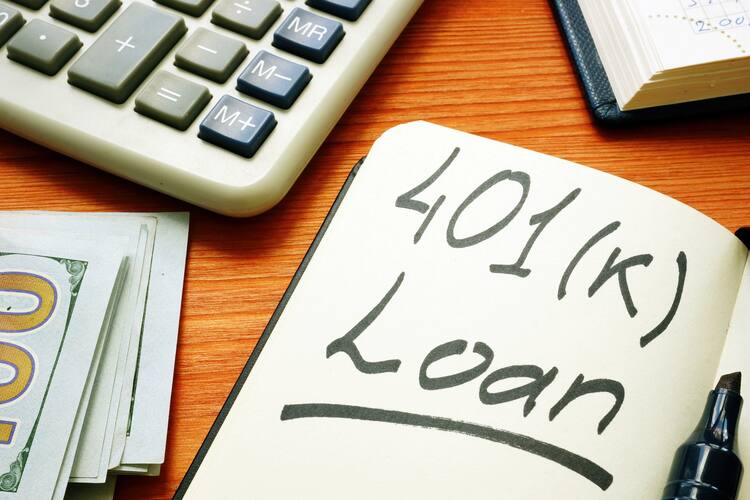401(k) Loan – Borrowing From or Robbing Yourself?

As people start to build their 401(k) nest eggs, they may find themselves accumulating what looks like a tempting reserve of money they can tap into. While 401(k) plans may allow participants to borrow from their balances without a tax penalty, doing so could permanently damage your retirement savings.
What can be the harm? Isn’t borrowing from your 401(k) simply borrowing from yourself? In many cases, 401(k) loans represent robbing yourself rather than borrowing from yourself. Learn about the important considerations you must think about when taking out a loan on your retirement account.
Frequently Asked Questions for 401(k) Loans
How does a 401(k) loan work?
When you take a loan from your 401(k), you are essentially borrowing money from yourself and paying yourself back with interest. How much you can take out depends on your 401(k) manager, but the IRS has some rules for this. You usually can’t take out more than 50% of what’s in your account, up to $50,000. You may not be able to borrow any funds your employee has matched. You may also be required to have a specific reason for borrowing, such as for a down payment on a house, medical expenses, or some other compelling reason.
How do I get a 401(k) loan?
You must fill out loan forms and sign paperwork that includes the loan amount, terms of repayment, interest rates, and fees, as you would for any loan. You will need to go through an approval process, and you must agree to have payments to the loan taken out of your paycheck.
Is it bad to take a loan from your 401k?
It’s better than just taking an early withdrawal, but it’s still a good idea to use this only among your last resorts and only if you’re sure you can pay it back. Compare your options, including taking out a personal loan instead of a 401(k) loan.
How long do you have to pay back a 401(k) loan?
In most cases, you have up to five years to pay it in equal payments.
Can you borrow from your 401(k) without penalty?
You may have to pay a fee, but you won’t be taxed or penalized by the IRS unless you don’t pay the loan plus interest back. If you have loan payments taken out of your paycheck, for example, and leave your job with a balance on the loan and don’t pay the rest back, you’ll be taxed on it and pay the 10% penalty if you are under age 59 ½.
What happens if you don’t pay a 401(k) loan back?
Failure to meet these 401(k) loan rules may result in the loan being treated as a distribution from the 401(k) plan, subjecting it to taxes and penalties.
Do all 401(k) plans let people borrow money from their accounts?
Not all 401(k) plans allow you to borrow from the plan. Check with your employer to see if this option is even available.
Borrowing from 401(k): What could go wrong?
Given those ground rules, what is wrong with borrowing from a 401(k)? The following five problems may result:
1. You might shortchange future contributions to pay back the loan.
Most people struggle to find room in their budgets for 401(k) contributions under normal circumstances, but if you are making loan repayments it could be even more difficult. Repaying a loan is likely to reduce or even eliminate any new contributions to your 401(k) for as much as five years, which would be a serious setback to retirement savings. By the way, those repayments have to come from after-tax dollars, since — unlike 401(k) contributions — loan repayments are not tax deductible.
2. You may force a short-term liquidation of long-term assets.
Your 401(k) balances are generally invested with a long-term time horizon in mind. Borrowing from the plan moves that time horizon up from retirement to right now. This may force liquidation of some assets at a bad time, such as when the stock market is down.
3. You miss out on investment earnings while the loan is being repaid.
You may repay the loan principal, but this won’t make up for the investment earnings you miss out on while part of your balance is out of the plan.
4. An employment change could force you to pay back the loan immediately.
Since many employers require you to leave their 401(k) plan when you leave the company, losing or changing your job could force you to repay the loan immediately. A job change is often a time of financial stress anyway, and having to repay a 401(k) loan all at once could add considerably to that stress.
5. Failure to meet IRS 401(k) loan requirements could mean taxes and penalties.
If you fail to comply with the borrowing and repayment rules for 401(k) plans, the amount of money that is out of compliance may immediately be subject to income taxes, plus the 10 percent IRS penalty for early distributions from a retirement plan.
Once money goes into a 401(k) plan, it’s best not to view it as a resource that is always available to you. Think of it as belonging to your future self rather than your present self. When you reach retirement, your future self might feel robbed if you have previously used this money in ways that have diminished what you have left to live on.